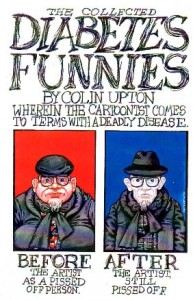 Colin Upton has worked in small press comics for over 25 years and been published by Fantagraphics and Aeon. He is passionate about the study of history and telling stories using the language of comics. He calls himself the grand old man of Vancouver small press scene and I was fortunate to have Colin answer some questions for me and here is the interview:
Colin Upton has worked in small press comics for over 25 years and been published by Fantagraphics and Aeon. He is passionate about the study of history and telling stories using the language of comics. He calls himself the grand old man of Vancouver small press scene and I was fortunate to have Colin answer some questions for me and here is the interview:
David: What was your introduction into the comic’s world, where did it start and how did you get your work shared with the rest of the world?
Colin: Growing up in the sixties comics were always there, a part of every child’s, particularly every boys, life. There were many more genres than there are today in “mainstream” comics, humour, girls, kids, TV tie-ins, jungle, war etc… I was also fascinated by vintage comics I discovered in books, Mad Magazine, editorial cartooning, newspaper strips (most of all Peanuts by Charles Schultz) and I read British comics that were easier to get on newsstands back when British Columbia was more “British”. But I think it wasn’t until I discovered English translations of Franco-Belgian comics like Asterix, Tintin and Lucky Luke that I started to take comics seriously. In 1985 I became part of the small pres mini-comics revolution made possible by the introduction of inexpensive photocopy technology. I gave away or traded copies to cartoonists I admired, sold in stores, at conventions and much of it went through the mail. By hanging out at the right parties I eventually was published by several companies, few of which survived the experience. Now I’m back doing small press.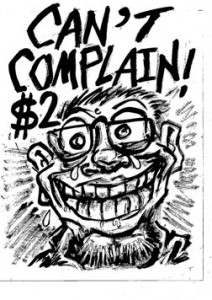
David: You are known for your roll in the small press/mini comic’s scene. You have also done other comics for Fantagraphics among others. Tell me about mini comics and its impact on you and comics.
Colin: For better or worse small press comics forever changed the relationship between comic creators and publishers. Even the free wheeling underground cartoonists had to deal with editors and publishers demands and interference. Small press cartoonists had no such constraints on their creativity and became accustomed to have total control over their work. It was experimental, democratic, creative anarchy and at times of course “Self-Indulgent”. Many of the greatest names in Indie Comics started out in small press. It allowed me to inexpensively practice my writing and drawing skills, experiment, discover what it was I wanted to talk about in comics, and find like-minded “weirdoes” (Robert Crumb’s Weirdo comic was a gathering place for many small press cartoonists).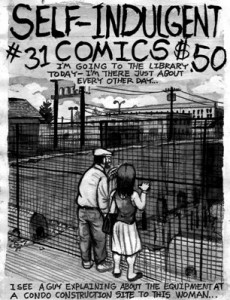
David: You have been drawing comics for a long time, do you have any advice for Artist starting out or wanting to get involved with the comics world?
Colin: Draw lots. Even if you draw on a computer you should go outside with a sketchbook and draw from life. Drawing is not just a skill; it is a way of seeing the world. It is a way to strip down reality to its essential lines and tones. Keep a diary; write down observations that might lead to a story. Get online, web comics are today’s evolution of small press comics, a cheap way to make comics and build communities, although it can never totally replace face to face contact with fellow cartoonists and readers. Don’t bother trying to find a “selling” formula, it usually shows and it rarely works. Honestly follow your muse where ever it takes you. Start out small at first and later tackle something more ambitious. Read lots of comics, different kinds of comics from different cultures… absorb but don’t copy. Read Scott McClouds “Understanding Comics”, “Making Comics” and David Chelsea’s “Perspective for cartoonists” is good too. A good library should have them.
David: What are your future plans as a comic’s artist?
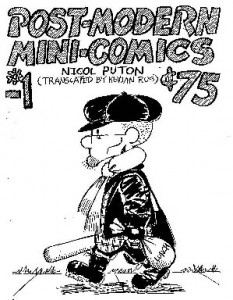 Colin: Not much, I just do comics; I’m not very good at selling myself. Last year I had big plans for projects, writing a documentary on underground comics, illustrating a book for Random House and getting a Canada Council grant to complete a graphic novel but none of that panned out. Along with a fan in North Carolina I am putting together a graphic novel collection of my Diabetes Funnies mini-comics to be published as a print on demand book with Lulu.com. See how that goes. I’ve been contributing to an energetic bunch of Vancouver cartoonists “Cloudscape Comics”; we self-publish comics and graphic novels. Our latest GN, 21 Journeys, is fund raising right now.
Colin: Not much, I just do comics; I’m not very good at selling myself. Last year I had big plans for projects, writing a documentary on underground comics, illustrating a book for Random House and getting a Canada Council grant to complete a graphic novel but none of that panned out. Along with a fan in North Carolina I am putting together a graphic novel collection of my Diabetes Funnies mini-comics to be published as a print on demand book with Lulu.com. See how that goes. I’ve been contributing to an energetic bunch of Vancouver cartoonists “Cloudscape Comics”; we self-publish comics and graphic novels. Our latest GN, 21 Journeys, is fund raising right now.
David: Do you have a favorite comic of all time by someone else, and one you most identify with?
Colin: A difficult question, I guess I’d have to say my favourite of Herge’s Tintin books, “Tintin in Tibet. More than anyone I am a cartoonist because of Herge. I spent hours as a child trying to understand and unlock the secrets of his comics, superficially simple but a masterpiece of clear, concise storytelling. The impression I got was that he could draw anything.
David: What work of your own are you most proud of?
Colin: Every new comic… I’m still here.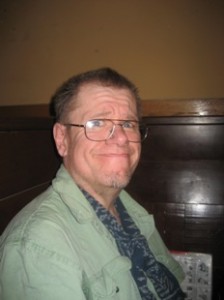
You can find more of Colin Upton’s work on his website at www.colinupton.com
Thank you so much Colin!
Go check him out!
